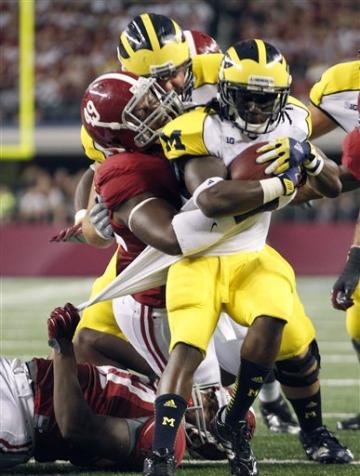Meet Vincent Smith, recipient of Jadeveon Clowney's famous hit and community activist

The name Vincent Smith doesn't register with a lot of college football fans.
The image of Vincent Smith in January's Outback Bowl? Everyone knows that.
Smith is the former Michigan running back who was blasted by Jadeveon Clowney late in that game. More accurately, Clowney ran straight through him. The crushing hit forced a fumble, changed the momentum of the game, and launched the South Carolina pass rusher into football fame. There was even off-season debate about whether Clowney would have gotten ejected under the new rules for his ferocious tackle.
But what became of Smith? What happened to the victim of one of the most famous tackles in college football history? And what's it like turning on the TV every weekend and seeing a highlight of yourself getting separated from the ball and your helmet?
First and foremost: Smith is OK. He was OK right after the hit, too. He went through the concussion testing protocol and went right back into the game. "I didn't miss a series," he says. "I didn't miss a play."

[Watch: Miami penalties a 'lose-lose-lose' scenario]
Smith says he keeps his chinstrap loose and that's why the headgear flew off. He thinks that's part of the reason the hit became such a big deal. "I give him credit for the tackle," Smith says, "but it wasn't the hardest hit."
Smith says he's seen the play "a couple times" and it doesn't bother him (although he wishes someone would replay the special teams hit he made earlier in that game). Smith's older brother, Jawarski Bouie, quickly grew tired of seeing his sibling getting trucked over and over again – as Smith puts it, "You know how big brothers are about little brothers." Smith, for his part, just wanted to move on.
And he has moved on – in quite a unique way.
Smith grew up in "Muck City," the part of the Everglades region of Florida known for producing sugar cane and speedy football players including Anquan Boldin, Fred Taylor and Santonio Holmes. The legend is that football players from Muck City are so fast because they grow up chasing rabbits. Travis Benjamin, a wide receiver for the Browns, is nicknamed "Rabbit" because of this, and Smith chased rabbits growing up as well. The poignant part of growing up in the Everglades is that many kids can't run from poverty, and football feels like the only way out.
Smith got out, and now he's making it his mission to come back to Muck City and stay.
During his time at Michigan, Smith and teammate Martavious Odoms came up with the idea to build community gardens back home after they graduated. The goal was to provide food to locals who needed it and sell the rest. It was a more sustainable form of the rabbit chase: instead of hawking skins for $2 a pop, they could sell produce and maybe create jobs.
"The idea was a brainstorm based on how our area is sugarcane and corn," Smith says. "If we have this muck and it's so rich, we might as well give back in a major way."
Smith didn't just brainstorm. He phoned the mayor of his hometown.
"He called me and he said he wants to do something in town," says Pahokee mayor Colin Walkes. "He wanted to use what we have to keep us self-sufficient."

The mayor was all for it, and the first shovel hit the ground this summer, only a few weeks after Smith graduated. Walkes drove by the first garden recently and saw several people working on it. To him it's a shining example of what a college scholarship is worth not only to an athlete, but to an entire community.
"When you have good players, usually they leave the small communities and go off to big cities and they get soaked up by big city," says Walkes. "He didn't get soaked up. He came home. We're proud to have him. A lot of kids look up to him and want to be like him. They'll want to come back and build the community itself."
Smith is hoping to raise money to keep the garden going and build one in every neighborhood. He's gone so far as reaching out to some former teammates – including former Michigan QB Denard Robinson, who now plays for the Jacksonville Jaguars – for help and support. "It would feed so many people," he says, "and it would be healthy."
He still hasn't given up on his NFL dreams, but he intends to make Pahokee his home for good. He even plans beyond this particular project. He wants to work for the city full time and, when asked if he could see himself holding office in the region one day, he quickly said, "Yes." Football wasn't just a way out; it was a way back.
"I just used the football to bring smiles to people's faces," Smith says. "That's where I got the most joy out of it."
There wasn't much joy in getting hit by Clowney and becoming a constant reminder of a future pro's talent, but a greater goal is in sight and Smith doesn't see anything getting in his way.

